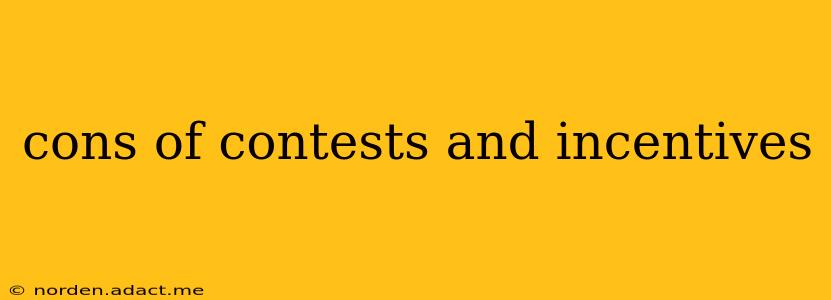Contests and incentives are powerful tools for boosting engagement, driving sales, and generating excitement. But like any marketing strategy, they come with their own set of drawbacks. Understanding these potential downsides is crucial for making informed decisions and maximizing the return on your investment. This article delves into the potential cons of contests and incentives, providing a balanced perspective to help you navigate this marketing landscape effectively.
Can Contests and Incentives Really Backfire?
Yes, absolutely. While the allure of increased engagement and brand awareness is strong, poorly planned contests or overly generous incentives can lead to unintended consequences. These can range from financial strain to reputational damage. It's essential to weigh the potential benefits against the risks before launching any campaign.
What are the Potential Drawbacks of Contests?
Let's examine some common pitfalls associated with contests and incentive programs:
High Costs and Low ROI:
- The Price of Participation: Contests often require significant investment in prizes, marketing, and administration. If participation is low or the prize payout is disproportionately high compared to the increase in sales or brand awareness, the return on investment (ROI) can be disappointingly low.
- Unexpected Expenses: Unexpected costs can arise. For instance, you might need to invest more in legal fees to ensure contest rules comply with regulations or pay for extra customer service staff to manage an unexpectedly high volume of entries.
Legal and Regulatory Compliance:
- Complex Rules and Regulations: Navigating the legal landscape of contests can be complex, varying by jurisdiction. Failure to comply with rules regarding transparency, fairness, and random selection can lead to legal challenges and reputational damage.
- Misunderstandings and Disputes: Ambiguous contest rules can lead to misunderstandings and disputes among participants, creating negative publicity and consuming valuable time and resources resolving conflicts.
Focus on the Wrong Metrics:
- Vanity Metrics: Contests can inflate certain metrics (like social media engagement) without necessarily translating into meaningful business outcomes, such as increased sales or brand loyalty. It's vital to define clear, measurable goals before launching a contest.
- Short-Term Gains, Long-Term Losses: Focusing solely on short-term gains from contests might detract from building a sustainable brand and customer relationships. The initial excitement might fizzle out quickly, leaving you with no lasting impact.
Negative Brand Perception:
- Spam and Frustration: Aggressive contest promotion can be perceived as spammy and annoying by potential customers. A poorly executed contest might lead to negative reviews and damage your brand image.
- Perceived Lack of Authenticity: Contests that feel forced or inauthentic can harm brand credibility. Customers may see through transparent attempts to manipulate engagement.
Cheating and Fraud:
- Entry Manipulation: Participants might attempt to game the system by creating multiple entries or using fraudulent methods to increase their chances of winning. This undermines the fairness of the contest and wastes resources on verifying entries.
- Prize Claiming Issues: Difficulties with prize claiming can lead to frustration and negative feedback. It's crucial to have a clear and streamlined process for distributing prizes.
What are Some Common Drawbacks of Incentives?
Incentives, while offering immediate appeal, can also lead to unforeseen issues:
Dependence and Reduced Intrinsic Motivation:
Over-reliance on extrinsic rewards (incentives) can reduce intrinsic motivation. Customers might only engage with your brand because of the incentive, not because they genuinely value your product or service. This can lead to a decrease in engagement once the incentives are removed.
Manipulation and Unethical Practices:
Incentives can be misused to manipulate customer behavior, leading to ethical concerns. For instance, overly aggressive sales tactics driven by incentive schemes might create negative brand perception.
Unrealistic Expectations:
Setting unrealistic expectations regarding incentives can backfire. Customers might feel cheated or disappointed if the reward doesn't live up to the hype.
Limited Impact on Long-Term Growth:
Similar to contests, focusing solely on incentives for short-term gains can undermine the building of a strong and sustainable brand identity.
How to Mitigate the Risks of Contests and Incentives?
- Clearly Defined Goals: Set clear, measurable, achievable, relevant, and time-bound (SMART) goals before launching any contest or incentive program.
- Thorough Planning and Budgeting: Develop a comprehensive plan outlining all aspects of the campaign, including budgeting for potential unexpected costs.
- Compliant Rules and Regulations: Consult with legal professionals to ensure your contest or incentive program complies with all relevant regulations.
- Transparent and Fair Practices: Maintain transparency throughout the process and ensure fairness to all participants.
- Effective Promotion and Communication: Promote your campaign strategically to avoid being perceived as spammy.
- Post-Campaign Analysis: Evaluate the results of your campaign and learn from any mistakes made.
By carefully considering these potential downsides and implementing appropriate mitigation strategies, you can maximize the benefits of contests and incentives while minimizing the risks. Remember, a well-planned and executed contest or incentive program can be a powerful marketing tool—but only when approached thoughtfully and strategically.
